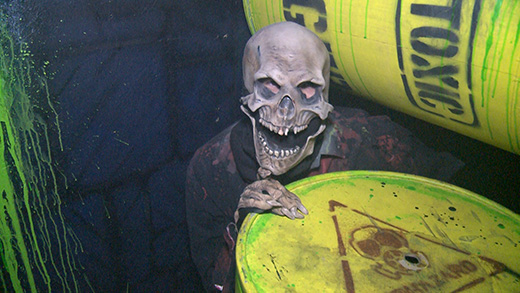Like a good scare? You're not alone, according to a Kansas State University psychological sciences professor
Wednesday, Oct. 28, 2015

A Kansas State University psychological sciences expert says there is a social aspect to haunted houses and that people will subject themselves to immense fear to gain social status. | Download this photo.
MANHATTAN — For many, Halloween is a night filled with treats, costumes, ghosts, ghouls and some fear — which can be a good thing, according to a Kansas State University expert.
Don Saucier, associate professor of psychological sciences in the university's College of Arts & Sciences, says that there is evolutionary value in fear.
"Fear is adaptive," Saucier said. "Fear keeps us safe. We are afraid of heights because we know we can fall, and we are afraid of the dark because it holds the unknown."
But if fear is an evolutionary aspect to survive, then why do people enjoy feeling fear on Halloween?
Saucier says that society enjoys embracing the spirit of the holidays. Being scared on Halloween is culturally embedded, such as giving is embedded in the Christmas holiday.
Fear also causes arousal for those being scared. People's hands may shake, their heart may beat faster and they may begin to sweat. Partaking in being scared on a holiday like Halloween then makes this arousal nonthreatening; feeling fear becomes fun, Saucier said.
So, if feeling fear becomes fun in a nonthreatening atmosphere around Halloween, then why are people willing to visit those mega-haunted houses where they have to sign a waiver to even enter?
"There is a social aspect to haunted houses," Saucier said. "Halloween becomes a competition where people subject themselves to immense fear to gain social status. They try to become a 'survivor.'"
Haunted houses are a culturally related activity associated with a popular holiday and they provide the opportunity for people to gain social status by engaging in it, Saucier said. The activity of visiting and surviving haunted houses becomes an experience that is, most of the time, shared with friends.
"Some researchers argue that happiness comes from experiences," Saucier said. "These experiences are more pronounced when shared with friends, and most people who go through haunted houses, go as groups."
The experience of fear creates a social connection, he said. When people are scared, they look for support and consolation. When people subject themselves to feeling fear in haunted houses with their friends, they create a lasting experience that gives them a reason to be together.
